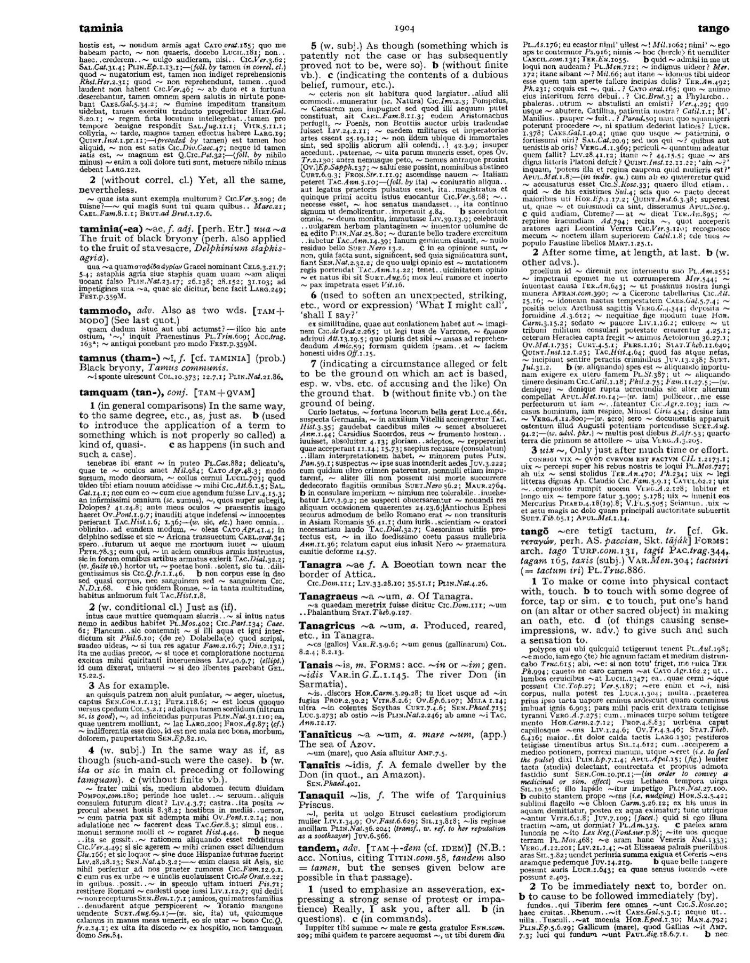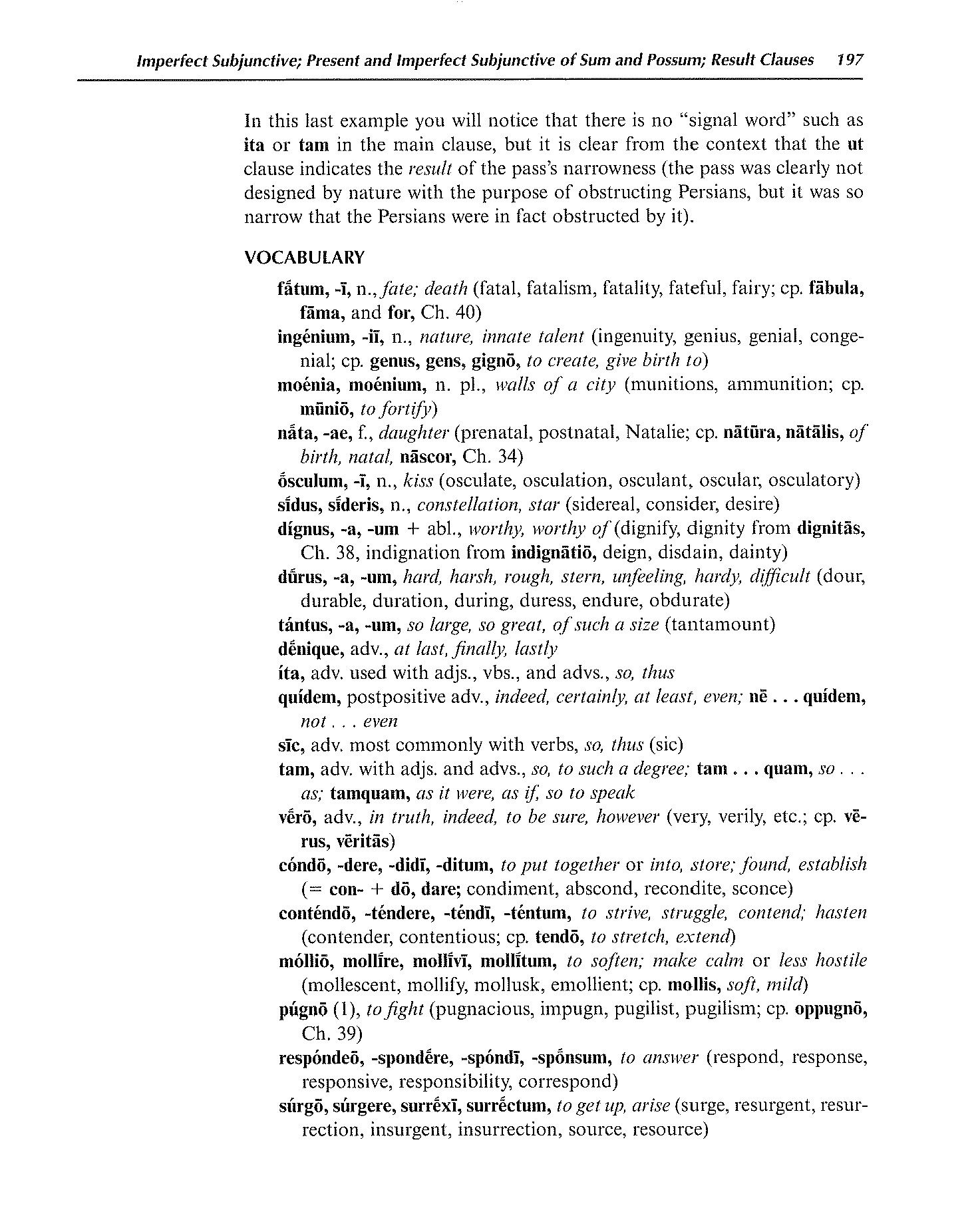
page_listing.tpl
page_subListingDetails.tpl
sub_listingDetails_style1.tpl
sub_listingDetails.title.tpl
tamquam as if
tamquam is a Latin Adverb that primarily means as if.
Definitions for tamquam
Wheelock's Latin
Adverb
- 1
as it were, as if, so to speak
Oxford Latin Dictionary
Adverb
- 1
(in general comparisons) In the same way, to the same degree, etc., as, just as. (b) (used to introduce the application of a term to something which is not properly so called) a kind of, quasi-. (c) as happens (in such and such a. case).
- 2
(w. conditional cl.) Just as (if).
Sentences with tamquam
Latin to English
Ipse enim se quisque diligit, non ut aliquam a se ipse mercedem exigat caritatis suae, sed quod per se quisque sibi carus est; quod nisi idem in amicitiam transferetur, verus amicus numquam reperetur: est enim is qui est tamquam alter idem.Compare Everyone loves himself, not with a view of acquiring some profit for himself from his self-love, but because he is dear to himself on his own account; and unless this same thing were transferred to friendship, the real friend would never be found; for he is, as it were, another self.
Sic vive cum hominibus, tamquam deus videat; sic loquere cum deo, tamquam homines audiant.Compare Live among men as if God beheld you; speak with God as if men were listening.
Cum Caesar sedisset, statim ei tamquam salutandi causa coniurati appropinquaverunt.Compare When Caesar had taken his seat, the conspirators approached as if to greet him.
Videor ego fabula aetas perago, nec, tamquam inexercitatus histrio, in extremus actus corruo.Compare They appear to me to have brought the play of life to a close, and not, like unpractised actors, to have broken down in the last scene.
Dies et nox, tamquam avis ille, mare prospecto, evolo cupio.Compare All day and night, like that bird, I look forth on the sea, and desire to fly away.
Data sources
Notes
- Definitions
- Frederick M. Wheelock, Wheelock's Latin, 6th ed., rev. Richard A. LaFleur (New York, NY: HarperCollins Publishers, 2005): 197.
- P. G. W. Glare, Oxford Latin Dictionary, Vols. 1-8 (Oxford: Clarendon Press, 1982): 1904.
- Word frequencies
- Christopher Francese, "Latin Core Vocabulary," Dickinson College Commentaries, last modified 2014, http://dcc.dickinson.edu.
- Paul B. Diederich, The Frequency of Latin Words and Their Endings, PhD diss., (Columbia University, 1939).
- Louis Delatte, Suzanne Govaerts, Joseph Denooz, and Etienne Evrard, Dictionnaire fréquentiel et index inverse de la langue latine [Frequency Dictionary and Inverse Index of the Latin Language] (Liège, Belgium: Laboratoire d'analyse statistique des langues anciennes de l'Université de Liège [L.A.S.L.A.], 1981): 122.
Bibliography
Allen, Joseph H. Allen and Greenough's New Latin Grammar for Schools and Colleges: Founded on Comparative Grammar. Edited by James B. Greenough, George L. Kittredge, Albert A. Howard, and Benjamin L. D'Ooge. Boston, MA: Ginn & Company, 1903.
Crystal, David. A Dictionary of Linguistics and Phonetics. 6th ed. Oxford, UK: Blackwell Publishing, 2008.
Delatte, Louis, Suzanne Govaerts, Joseph Denooz, and Etienne Evrard. Dictionnaire fréquentiel et index inverse de la langue latine [Frequency Dictionary and Inverse Index of the Latin Language]. Liège, Belgium: Laboratoire d'analyse statistique des langues anciennes de l'Université de Liège (L.A.S.L.A.), 1981.
Diederich, Paul B. The Frequency of Latin Words and Their Endings. PhD diss., Columbia University, 1939.
Francese, Christopher. "Latin Core Vocabulary." Dickinson College Commentaries. Last modified 2014. http://dcc.dickinson.edu/latin-vocabulary-list.
Gildersleeve, Basil L., and Gonzales Lodge. Gildersleeve's Latin Grammar: Third Edition, Revised, and Enlarged. 3rd ed. London, England: Macmillan and Co., 1903.
Glare, Peter G.W. Oxford Latin Dictionary. Vols. 1-8. Oxford, England: Clarendon Press, 1982.
Krüger, Bernd. "Latin Conjugation Tables." Cactus2000. Accessed May 5, 2023. https://latin.cactus2000.de/index.en.php.
Pierson, Nick. "Sound of Text." Accessed October 26, 2019. https://soundoftext.com.
Wheelock, Frederick M. Wheelock's Latin. 6th ed. Revised by Richard A. LaFleur. New York, NY: HarperCollins Publishers, 2005.
Wiktionary Contributors. "Victionarium." Wikimedia Foundation, Inc. Updated March 18, 2019. https://la.wiktionary.org/wiki/Victionarium:Pagina_prima.
Citation
Chicago (17th ed.)
Allo Contributors. "tamquam (adv.) - Latin Word Definition." Allo Latin Dictionary. Last modified . Accessed February 20, 2026. http://ancientlanguages.org/latin/dictionary/tamquam.
Entry created on . Last updated on .







